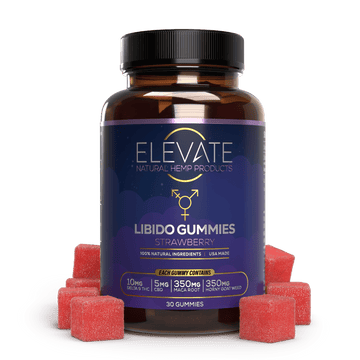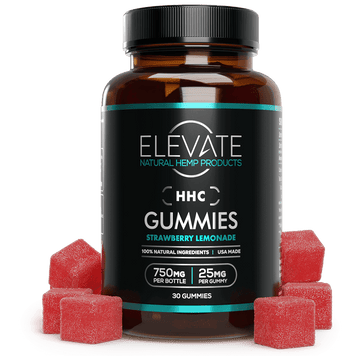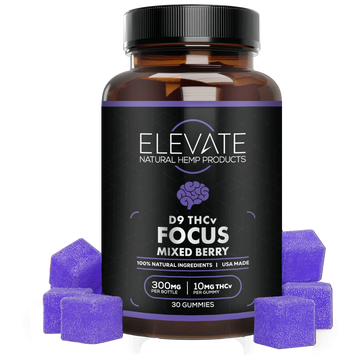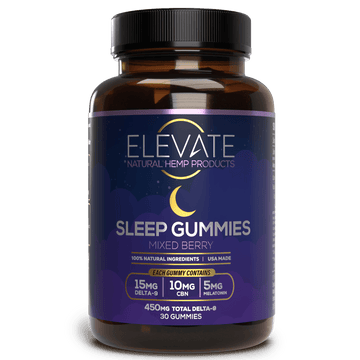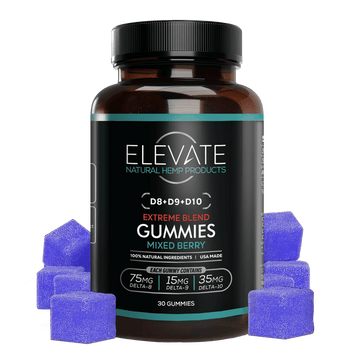You're enjoying the unique benefits of Delta 8, but one big question is likely on your mind: does it show up on a drug test? The short answer is yes, and the reason is simple science. Your body breaks down Delta 8 and Delta 9 THC into nearly identical compounds—the very ones standard tests are designed to detect. We'll explain exactly why these tests can't tell the difference, how long it can stay in your system, and what you need to know before a Delta 8 drug test.
What is Delta 8?
Delta 8 tetrahydrocannabinol, commonly known as Delta 8 THC, is a naturally occurring cannabinoid found in the cannabis plant. It is one of the many chemical compounds present in cannabis, belonging to the same family as the more well-known Delta 9 THC.
Delta 8 THC shares a structural similarity with Delta 9 THC, differing only in the placement of a double bond in its molecular structure. This subtle variation is responsible for the distinct effects associated with Delta 8. While Delta 9 THC is renowned for its potent psychoactive properties, Delta 8 offers a milder, more subdued experience. Users often describe it as providing a gentle, relaxed state without the intense high commonly associated with Delta 9 THC.
Uses of Delta 8:
Anxiety Reduction
- Users have reported that Delta 8 may contribute to a reduction in anxiety.
- The compound’s psychoactive properties are said to induce a calming effect, making it a potential option for those seeking relief from anxiety-related symptoms.
Pain Relief
- Delta 8 has garnered attention for its potential analgesic properties.
- Some users claim that Delta 8 may provide relief from various types of pain, although research in this area is still in its early stages.
Enhanced Focus
- Individuals using Delta 8 have reported experiencing enhanced focus and concentration.
- Unlike other cannabinoids that may induce fogginess or mental haziness, Delta 8 is suggested to offer a clearer mental state, making it appealing to those seeking cognitive enhancement.
Mood Upliftment
- Users have noted a mood-lifting effect without the intensity often associated with Delta 9 THC.
- Delta 8’s unique psychoactive profile is said to induce feelings of euphoria and well-being without the risk of overwhelming sensations.
Appetite Stimulation
- Some individuals have reported an increase in appetite after consuming Delta 8.
- This can be particularly beneficial for those experiencing appetite loss due to medical conditions or treatments.
Sleep Support
- Delta 8 has been associated with potential sleep-inducing effects.
- Users suggest that the compound may help promote relaxation, making it a consideration for individuals struggling with sleep-related issues.
Antiemetic Properties
- Delta 8 has been explored for its antiemetic properties, potentially aiding in nausea and vomiting relief.
- This makes it of interest to individuals undergoing treatments such as chemotherapy, where nausea is a common side effect.
Neuroprotective Potential
- Some preliminary studies suggest that Delta 8 may have neuroprotective properties.
- This potential makes it an area of interest for researchers studying conditions related to neurodegeneration.
Understanding Potential Side Effects and Dependence
Psychological Dependence and Withdrawal
While Delta 8 is often chosen for its less intense effects compared to Delta 9, it's still important to be aware of the potential for psychological dependence. This isn't about physical addiction in the way we often think of it; rather, it's about the possibility of relying on Delta 8 to manage stress or other emotions. Research shows that people can become psychologically dependent on it. If someone stops using it, they might experience mild withdrawal symptoms like irritability, mood swings, or trouble sleeping. It's also worth remembering that even though Delta 8 is federally legal, its use can sometimes put your job or recovery at risk. Being mindful of your consumption habits and reasons for using any cannabinoid product is key to a positive and responsible experience.
Does Delta 8 Show Up on a Drug Test?
The detectability of Delta 8 in standard drug tests is a nuanced matter intricately tied to the drug testing method and procedures in place. Traditional drug tests are primarily designed to identify the presence of Delta 9 THC, the more widely recognized psychoactive compound in the cannabis plants. Owing to the structural similarities between Delta 8 and Delta 9, there exists a possibility that these tests may inadvertently register traces of Delta 8.
While the likelihood of a positive result for Delta 8 is generally lower compared to Delta 9 THC, caution remains paramount. The potential consequences of a positive drug test can impact various facets of an individual’s life, including professional endeavors. Therefore, understanding the nuances of drug testing and its interaction with Delta 8 becomes crucial for those navigating the cannabis landscape.
As Elevate guides you through this intricate terrain, our mission is to provide comprehensive insights to mitigate potential risks. We understand the desire to explore and enjoy the benefits of Delta 8 while maintaining a responsible and professional stance. It’s not just about partaking in the cannabis experience; it’s about doing so with informed choices that align with your lifestyle and obligations.
To optimize your approach, consider the following insights:
How Drug Tests Detect THC Metabolites
When you use a cannabis product, your body immediately starts to process it. It's a common misconception that drug tests are searching for the active THC compound you just enjoyed. In reality, they're looking for what's left behind after your body breaks it down. These leftovers are called metabolites, and they can hang out in your system—in places like fat cells and urine—long after the initial effects have faded. This is why you can test positive for THC days or even weeks after last use. The tricky part is that because Delta 8 and Delta 9 THC are so similar chemically, they produce almost identical metabolites, which is where the problem with drug testing begins.
Standard vs. Advanced Drug Screening
Most standard drug screenings, especially the common urine tests many employers use, aren't very sophisticated. They're programmed to detect a specific metabolite called THC-COOH, but they can't tell the difference between its source. This means the test can't distinguish whether that metabolite came from a federally legal product like Delta 8 gummies or from Delta 9 THC. To the test, it's all just THC, which will likely trigger a positive result. While more advanced and costly methods like Gas Chromatography-Mass Spectrometry (GC-MS) can differentiate between Delta 8 and Delta 9 metabolites, they aren't the norm for routine workplace testing. It's always safer to assume that any potential test will be a standard one.
Know Your Test
Understanding the specifics of the drug test you might undergo is crucial. Different tests, such as urine tests, saliva tests, or blood tests vary in their sensitivity and ability to detect Delta 8.
Stay Informed about Legalities
Stay abreast of the legal status of Delta 8 in your region. Regulations regarding Delta 8 can vary, impacting the consequences of positive drug test results.
Consider Temporary Abstinence:
If facing an impending drug test, temporary abstinence from Delta 8 might be a prudent choice. The duration for which Delta 8 remains detectable in the system varies, and understanding this can help in strategic planning.
The Legal Status of Delta 8
Federal vs. State Laws
The legal landscape for Delta 8 can feel a bit like a maze. On a federal level, the 2018 Farm Bill made hemp-derived products legal, which is why you can find Delta 8 gummies and other products available online. However, that's not the whole story. Because federal guidelines aren't crystal clear, many states have stepped in to create their own regulations. This has resulted in a patchwork of laws across the country, with some states banning or restricting the sale and use of Delta 8 entirely. Before you make a purchase, it's essential to check your local state laws to understand what's permitted where you live. Staying informed is the best way to enjoy Delta 8 responsibly and without any legal surprises.
Employer Drug Policies
Even if Delta 8 is perfectly legal in your state, your job might have different rules. Many employers maintain strict drug-free workplace policies, and these often don't differentiate between Delta 8 and Delta 9 THC. Since standard drug tests can't tell the difference and will likely show a positive result for THC, using Delta 8 could put you in a tough spot professionally. Failing a drug test, regardless of the substance's legality, could have serious consequences, from being passed over for a new role to losing your current job. It's always a smart move to be fully aware of your employer's specific drug policy before consuming any THC products. Your career is important, so make sure you have all the facts.
Delta 8 vs Delta 9: What’s the Difference?
Distinguishing between Delta 8 and Delta 9 is fundamental to grasping their unique impacts, particularly concerning drug tests. Despite sharing similarities in their molecular structures, these two cannabinoids exhibit notable differences in their psychoactive effects.
Delta 8: A Milder Experience
Delta 8 tetrahydrocannabinol (THC) boasts a chemical structure remarkably similar to Delta 9 THC, with the primary variance being the placement of a double bond. This subtle distinction, results in a less psychoactive compound. Users often describe Delta 8 as providing a milder, more manageable experience compared to its Delta 9 counterpart. The effects are characterized by a gentle euphoria and relaxation, making it an appealing option for those seeking a smoother cannabis encounter.
Delta 9: The Potent Psychoactive Compound
Delta 9 THC, on the other hand, is renowned for its potent psychoactive properties, responsible for the characteristic “high” associated with cannabis use. Its molecular structure, featuring a double bond in a specific location, contributes to a more intense interaction with the endocannabinoid system. Users may experience heightened sensations, altered perception of time, and an increased propensity for introspection.
Now, let’s delve into a comparative table to highlight the key distinctions between Delta 8 and Delta 9:
| Characteristic |
Delta 8 |
Delta 9 |
| Psychoactive Intensity |
Milder |
Potent |
| User Experience |
Gentle euphoria, relaxation |
Intense “high,” altered perception |
| Structural Difference |
Double bond placement varies |
Specific double bond location |
| Impact on Drug Tests |
Lower likelihood of detection |
Higher likelihood of detection |
| Medical Potential |
Analgesic, anxiolytic properties |
Antiemetic, appetite stimulant |
What is the duration for which Delta 8 remains traceable in your system?
Understanding how long Delta 8 remains traceable in your system is a key consideration for those navigating drug tests. While the duration varies based on individual factors, let us provide insights to help you navigate the nuanced landscape of cannabinoid metabolism.
Individual Factors Matter:
Metabolism and frequency of use play pivotal roles in determining how long Delta 8 remains detectable. Factors such as age, weight, and overall health contribute to the unique metabolic fingerprint of each individual.
Potential Shorter Detection Window:
Research indicates that Delta 8 may have a shorter detection window compared to its more potent cousin, Delta 9 THC. This suggests that, under certain circumstances, Delta 8 may be metabolized and cleared from the body more rapidly.
Elusiveness of Concrete Timelines:
Despite research efforts, providing concrete timelines for Delta 8 detectability proves challenging. The variability in individual responses and the lack of standardized testing protocols contribute to the elusive nature of establishing precise timelines.
Importance of Personalized Awareness:
Recognizing your unique metabolic factors and usage patterns empowers you to approach drug tests with confidence, making informed decisions that align with your circumstances.
Confident and Informed Approach:
Armed with knowledge about the potential factors influencing Delta 8 detectability, individuals can approach drug tests with a confident and informed mindset. This awareness allows for strategic planning, whether it involves temporary abstinence or understanding the likelihood of detection.
How to eliminate Delta 8 from your system:
Stay Hydrated:
Drinking plenty of water helps flush out toxins, including Delta 8 metabolites, through urine. Aim for at least 8 glasses a day to support your body’s natural detoxification process so as to pass urine drug tests.
Incorporate Exercise:
Regular physical activity boosts metabolism, aiding in the elimination of Delta 8. Engage in cardio exercises or activities that make you sweat to accelerate the detox process.
Dietary Strategies:
Consume a diet rich in fiber, antioxidants, and nutrient-dense foods. Incorporate fruits, vegetables, and whole grains to support your body’s ability to expel Delta 8.
Time Management:
Understand that the frequency of use and your metabolic rate influence how long Delta 8 stays in your system. The more frequent the use, the longer it might take to eliminate.
Consider Sauna Sessions:
Sauna sessions induce sweating, facilitating the removal of toxins. Consider regular sauna use to complement other detox methods and promote the elimination of Delta 8.
Supplemental Support:
Explore supplements that support detoxification, such as vitamin C, B-complex vitamins, and omega-3 fatty acids. These can aid your body in processing and eliminating Delta 8.
Temporary Abstinence:
Consider abstaining from Delta 8 for a period. Temporary abstinence allows your body time to naturally clear out the cannabinoid, decreasing the chances of detection for an upcoming drug test.
Detection Times by Test Type
The type of test you take is one of the biggest factors in whether Delta 8 will be detected. Each method has a different window of sensitivity, looking for either the active compound or its leftover metabolites.
Urine Tests
Urine tests are the most common form of drug screening for employment and legal purposes. For a one-time user, Delta 8 may be detectable for 2 to 5 days. If you use it moderately, say a few times a week, that window can stretch to 5 to 10 days. For heavy, daily users, Delta 8 metabolites can be found in urine for 15 to 30 days, or sometimes even longer. This is because THC metabolites are stored in fat cells and are slowly released over time, making them detectable long after the effects have worn off.
Saliva Tests
Saliva tests are gaining popularity because they are less invasive and provide quick results. They are designed to detect very recent use, with a typical detection window of 1 to 7 days. Because of this short timeframe, they are often used for roadside screenings or post-incident testing to determine recent consumption. The exact duration depends on your usage habits, but saliva tests are generally focused on identifying use within the last few days rather than weeks.
Blood Tests
Blood tests are less common for typical drug screenings because they have a very short detection window. They measure the active presence of THC in the bloodstream, which is only present for a brief period. Delta 8 is usually detectable in blood for just a few hours and up to 2 days after use. This method is typically used in specific scenarios, such as determining impairment at the time of an accident, rather than for routine employment checks.
Hair Tests
Of all the testing methods, hair follicle tests have the longest memory. They can detect Delta 8 metabolites for up to 90 days after your last use. As hair grows, metabolites from the bloodstream are deposited into the hair shaft, creating a long-term record of consumption. While effective, hair tests are more expensive and are not as frequently used for Delta 8 detection compared to urine tests. They are generally reserved for situations requiring an extended history of substance use.
Factors That Influence Detection Time
Beyond the type of test, several personal factors determine how long Delta 8 will remain in your system. Your body is unique, and how it processes cannabinoids depends on your habits and physiology.
Frequency and Dosage
This is one of the most significant factors. A single dose of Delta 8 will clear from your system much faster than if you use it regularly. With frequent use, THC metabolites accumulate in your body’s fat stores because you are consuming them faster than your body can eliminate them. This buildup means it will take much longer to clear the metabolites from your system. If you consistently enjoy Delta 8 gummies, you can expect a longer detection window compared to someone who only uses them occasionally.
Method of Consumption
How you take Delta 8 also makes a difference. When you consume edibles, the Delta 8 is processed through your digestive system and liver. This metabolic pathway is slower, causing the compound and its metabolites to linger in your system for a longer period. In contrast, inhaling Delta 8 via vaping or smoking delivers it directly to your bloodstream through the lungs. This method has a faster onset but also tends to be processed and eliminated by the body more quickly, often resulting in a shorter detection time.
Body Composition and Metabolism
Your individual body chemistry plays a crucial role. A person with a faster metabolism will process and eliminate THC metabolites more quickly than someone with a slower one. Additionally, since THC is fat-soluble, it is stored in fat cells. This means that individuals with a higher body fat percentage may retain these metabolites for a longer duration. The metabolites are released slowly from fat stores back into the bloodstream over time, extending the detection window even after you’ve stopped using the product.
Can You Speed Up Delta 8 Elimination?
If you have a drug test coming up, you’re probably wondering if there’s a way to clear Delta 8 from your system faster. It’s a common question, and the internet is full of supposed quick fixes and magic solutions. While some methods claim to speed up the detoxification process, it’s important to separate fact from fiction. The way your body processes and stores THC metabolites is a complex biological process that can’t be easily rushed. Understanding what works—and what doesn’t—is key to making an informed decision and avoiding any unwelcome surprises.
The Myth of Quick Detox Methods
You’ve likely seen ads for detox kits, special drinks, and supplements that promise to flush Delta 8 out of your system in a matter of days or even hours. Unfortunately, there's no guaranteed way to quickly get Delta 8 out of your system. Most of these products are not backed by scientific evidence and are unreliable. Because THC metabolites are stored in your body’s fat cells, simply drinking a lot of water won’t wash them out. While staying hydrated is always a good idea for your overall health, it won’t significantly speed up the rate at which your body metabolizes and eliminates these compounds. The most effective approach involves understanding your body's natural timeline.
Why Abstinence is the Only Guaranteed Method
When it comes to passing a drug test, the only truly foolproof method is abstaining from all Delta 8 products. Giving your body enough time to naturally process and clear the THC metabolites is the most reliable strategy. For infrequent users, Delta 8 may be detectable for 5 to 10 days. However, if you regularly enjoy products like Delta 8 gummies, it could remain in your system for several weeks. The safest choice is to completely avoid Delta 8 if you know you have a screening on the horizon. Planning ahead and taking a break is the best way to ensure you can pass your test with confidence.
Safety and Regulation of Delta 8 Products
While exploring the world of Delta 8, it's just as important to talk about safety as it is to discuss effects and benefits. The legal gray area that Delta 8 occupies means it isn't subject to the same strict regulations as other products. This lack of oversight puts the responsibility on you, the consumer, to be discerning about where you source your products. Understanding the potential risks and knowing what to look for can help you make safe and informed choices, ensuring your experience with Delta 8 is a positive one.
The Unregulated Manufacturing Process
Delta 8 THC exists naturally in cannabis plants, but only in very small amounts. To create the quantities found in products on the market, producers often synthesize it from hemp-derived CBD through a chemical process. The issue is that this process is largely unregulated. The FDA has explicitly stated that it has not evaluated or approved Delta 8 products for safe use. This means there are no federal standards for how Delta 8 should be made, what purity levels it must meet, or how it should be labeled. This results in a market where product quality can vary dramatically from one brand to the next.
Potential Contaminants and Health Risks
The chemical conversion process used to create Delta 8 can be complex. If not performed correctly and purified properly, the final product can contain unwanted and potentially harmful by-products. These contaminants might include residual solvents, acids, or even unknown compounds that were not part of the intended formula. The FDA has issued its own consumer update on these risks, and both the FDA and CDC have noted an increase in adverse event reports related to Delta 8 products. This highlights the real health risks associated with consuming untested items. Without proper oversight, there's no guarantee that the product you're buying is pure, potent, or safe for consumption.
The Importance of Third-Party Lab Testing
So, how can you protect yourself? The answer is third-party lab testing. Reputable brands send samples of their products to independent laboratories to verify their contents. These labs test for cannabinoid potency—ensuring the product contains the amount of Delta 8 advertised—and purity, screening for harmful contaminants like pesticides, heavy metals, and residual solvents. Always look for a recent Certificate of Analysis (COA) for any product you consider buying. At Elevate, we believe in full transparency, which is why we provide accessible lab results for all our products, including our popular Delta 8 Gummies. If a company doesn't make these results easy to find, consider it a major red flag.
Where to buy Delta 8?
At Elevate, we are committed to delivering excellence in the realm of cannabis, and this dedication extends to our Delta 8 products. Our carefully curated selection of Delta 8 offerings caters to a diverse range of preferences and requirements. We place a premium on quality, safety, and transparency, ensuring that your experience with Delta 8 is nothing short of exceptional.
Our Delta 8 products undergo rigorous testing, adhering to the highest standards to guarantee quality and safety. This commitment allows you to consume with confidence, knowing that each product has been thoroughly vetted for your satisfaction.
Recognizing that your choice of Delta 8 should align with your experience level, desired effects, and personal preferences, Elevate offers a varied selection to accommodate every individual’s unique needs.
Choose Elevate for a cannabis experience that is not only elevated but also built on a foundation of trust, transparency, and unwavering commitment to your well-being.


